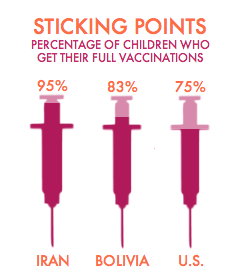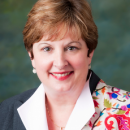
February 7, 2013 | Health and Well-Being, Violence Against Women, Economic Opportunity
She’s Got the Numbers
Sarah Kambou uses stats and research to improve women's lives.

If you want to fight the inequality that plagues women and girls worldwide, your best weapon is data. "We believe that if you have evidence, the metrics, the statistics that people are interested in, you can best formulate policy," says Sarah Degnan Kambou, president of the International Center for Research on Women, a nonprofit that is one of the planet’s prime resources for this vital information. A social scientist and a former director of CARE in Africa, Kambou recently added a new set of tasks to her busy agenda when she agreed to join the Global Development Council, which will advise President Obama on foreign policy as it relates to development. Kambou took our questions from her office in Washington, D.C.
When you were 10, did you think you would be doing this?
What I knew at ten was that I wanted to travel and I wanted to meet people from different cultures and I wanted to be able to talk to them directly. Was I going to be working in international development, was I going to be living in Africa for 11 years, would I end up at ICRW? No, that was completely hidden from view. It was a journey and it was a discovery.
What does the world stand to gain by putting gender equality at the forefront of all government initiatives?
We know that economies grow, communities prosper and households are in a much better position to deal with shocks to family members if there are contributions from all members of society. So if women are half the world's population, and if we want to advance economically, we must engage them productively.
In 2013, what are the most important issues ICRW is tackling?
Over the past 37 years, violence against women has been a core to the work we have done. The silent epidemic of violence against women has always been an issue, but with the growing media attention, it's no longer silent. Our other focuses will be women's economic empowerment, women in the workplace, and the healthy transition from childhood to adulthood.
What has been your biggest accomplishment with the ICRW?
Making the invisible visible through research and evidence. By showing how women are involved not only in the household sector but also the agricultural sector and many others, we have really been able to influence the global debate.
What do you hope to bring to the table at the Global Development Council?
I have worked my entire career with people living in communities. I feel I have a good insight into community life and community dynamics. I'm keen to help bring that perspective to a global level through the research we do here at ICRW. Having this opportunity to make the voices of women and girls heard at the highest levels of the U.S. government is just a tremendous opportunity.
Who is your biggest inspiration?
In terms of values and professional life, I have to say it was my maternal grandmother. She was a strong matriarchal figure. She deeply believed in me as a person and invested in me to develop my talents.
How do you recharge your batteries?
I really work hard to keep my priorities ranked the way I need them. Top priority in a very busy life is always my family. It's my mom, it's my husband, and it's my kids. Connecting with them on a regular basis and making sure to disconnect from everything else.
What advice do you have for the next generation of young women who want to change the world?
Follow your passion, follow your heart.
When someone finishes reading this interview, what is one thing you hope they take away from it?
That change is possible. We've been working for 30, 40 years addressing the issues of women and girls and we have made tremendous progress in many areas. Yes, there are challenges that remain, but through research and evidence we can solve this problem